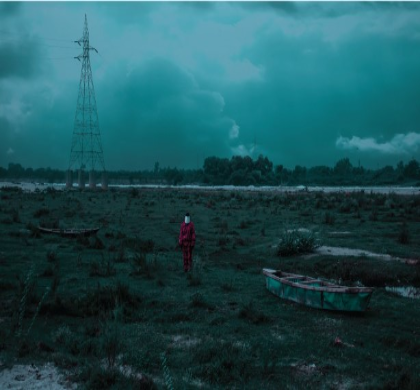
Barbed Wire
I was born in Kolkata, in 1940, seven years before independence and partition. When bhai was born, I was four years old. Baba sent me to my mother’s ancestral home in Taki because Ma could not look after two children at the same time. He said this was temporary and they loved me as they always had; even more now that I had a brother.
The house in Taki was not new to me; we visited every year during Durga puja. Dadu, Dida and Ramu Mama were the only three inhabitants of the huge fort-like house situated few yards away from the Ichamati river.
Shiuli was my cousin. Our mothers were sisters. She lived in Dhaka, far away from the Ichamati and further away from Kolkata. She was younger than me, by two months. Our parents said that we could call each other by our names. We met once a year, during Durga Puja, when she would also visit Taki with her parents.
Coming to Taki was like coming closer to Shiuli. I was very excited and did not understand why father reassured me of their love from time to time. I would go near the river and shout out her name with the firm belief that she could hear me from the other side. She never answered back. This made me angry with her, and I terminated our friendship. During Durga Puja, I asked her why she never answered back; she said she could not hear me, perhaps because I was not loud enough. On the final day of Puja, we were friends again and watched the idol immersion together. The devi was taken on two boats to the middle of the river and the boats parted on either side to let her sink. She was being sent away to her home just like Shiuli was sent away next day but she was on one boat instead of two.
On the next Durga puja, she told me about her school where she learnt to count in English. I could not count after ten, not even in Bengali. She taught me ten words in English, the first ten numbers up to nine from zero. That year I was also admitted in school which taught me to count beyond ten but not in English. On my sixth birthday I could even read few words in Bengali but Shiuli could write as well. The letter that we received from them that year expressing their inability to visit during puja, also had a single line written in uneven handwriting by Shiuli enquiring about my well-being.
Surprisingly, soon I was taken back to Kolkata even though bhai was still young and it was still difficult for mother to take care of us both. Baba said it was not safe to live near the border. I thought he was speaking about Icchamati because it was a border; it divided Shiuli and me. But father corrected me. He was talking about a border made of steel wires with sharp edges at regular intervals, barbed wires, that was to be installed near Ichamti to divide India, our country and Bangladesh, Shiuli’s country. I did not even know that we lived in two different countries.
Baba also said that Shiuli’s family could come and live in Taki if the situation worsened in Bangladesh. The idea of Shiuli and me living together in the same house, throughout the year, learning numbers together and doing more was most exciting. But Shiuli did not come and live in Taki. She did not even come during the pujas. I counted nine Durga pujas, all in English. I never saw her again. I convinced myself that Shiuli had to be living in the refugee camps that father spoke about and would soon find us and we could live together forever, in Kolkata or in Taki. Every year, on the last day of puja, the border was opened for immersions from both sides. I expected Shiuli to call out my name from the other side of the river. She never did.
